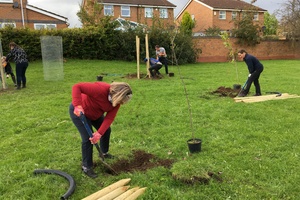-
New megalab has processed almost 300,000 COVID-19 tests in its opening weeks and thanks to our world-leading science and infrastructure and genomic sequencing capabilities is set to play a critical role in the government’s ongoing response to COVID-19
-
Laboratory set to be major local employer with over 500 staff now employed at the lab, and up to 1,500 new jobs expected in total
-
The health and economic benefits of capabilities like this new lab which develops our life sciences sector will help the UK build back better
Over a quarter of a million COVID-19 tests have been processed and up to 1,500 new jobs are being created at a new megalab in Leamington Spa, which Health and Social Care Secretary Sajid Javid and Chief Executive of the UK Health Security Agency (UKHSA) Jenny Harries visited today (Thursday 12 August).
They met staff and saw state-of-the-art cutting-edge testing technology in action – including top of the range robotics – at the Rosalind Franklin laboratory which opened on 13 July. The lab is already making phenomenal progress, processing almost 300,000 COVID-19 tests in its opening weeks as part of the NHS Test and Trace network.
The biggest of its kind in the UK, this megalab will rollout pioneering new genotype assay testing in the coming months to help scientists quickly identify known variants of concern, as well as genome sequencing to identify new mutations. This technology is already helping the UK take decisive action to supress outbreaks as restrictions have been eased, such as deploying surge testing.
The laboratory’s name honours Rosalind Franklin, whose legacy includes significant contributions towards our current understanding of RNA sequencing, which is now a major tool in our efforts to combat variants of concern.
Health and Social Care Secretary Sajid Javid said:
“The new Rosalind Franklin laboratory is bringing together some of the world’s leading scientists and large scale, state-of-the-art testing infrastructure under one roof.
“Along with vaccinations, regular testing is playing an integral role in helping us manage this virus and will help ensure we are prepared for future pandemics. This megalab will soon be helping us not only process tests, but also detect the kind of variants that threaten our progress in living with COVID-19.
“The laboratory is also a huge boost for the local area creating employment opportunities and inspiring a new generation into careers in science and technology.” The new laboratory is creating employment for local people, with nearly 500 people on-boarded already and over 500 more joining in the near future, with up to 1,500 jobs expected when the lab is fully staffed. Around 60% of the staff hired so far live within 30 miles of the site.
The Rosalind Franklin Laboratory is providing new opportunities to drive the next generation of biotechnology discoveries investing and developing our expertise in genomics and health data. The Laboratory aims to create and upskill scientists with a programme of training and, with close links to universities, to inspire a new generation to choose a career in Science, Technology, Engineering and Mathematics (STEM). The first cohort of PhD students from the local University of Warwick have begun their placements at the lab as data scientists and bioscience leads gaining hands-on experience on the frontline of COVID-19 testing. The university is working closely with the laboratory to continue developing opportunities for collaboration, including research and professional training.
Investments like the laboratory is just one in a number of significant opportunities for improving healthcare beyond the pandemic putting research as the backbone of health care innovation.
Chief Executive of the UK Health Security Agency (UKHSA) Jenny Harries said:
“The newly established UK Health Security Agency has been formed to help protect the UK not only against COVID-19, but from the health threats and pandemics of the future.
“This megalab is going to be right at the heart of our present and future battles against national health threats and it is already arming our exceptional scientists with the right testing and genomics infrastructure to manage the spread of COVID-19.
“As well as helping us combat this virus, our hope is that many of the leading scientists of tomorrow will begin their careers in STEM here at the Rosalind Franklin laboratory in the months and years ahead.”



